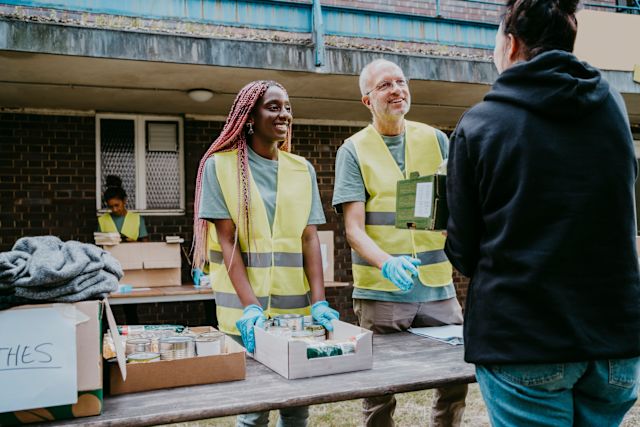Updated on January 7, 2025.
The past several years have seen a range of crises and tragedies that have penetrated communities across the country. From the COVID-19 pandemic to wildfires and hurricanes, millions of Americans have had their lives upturned.
At the same time, these crises have witnessed a wellspring of volunteer spirit among neighbors and communities. Many people have realized that one of the best antidotes to feeling helpless is taking action to make the world a better place by volunteering, either virtually or in person.
Not only does lending a hand to those in need help people experiencing trauma, but more and more research is demonstrating that volunteering actually offers benefits—spiritual, emotional, physical, and mental—to those doing the volunteering.
Finding purpose in volunteering
A large body of research suggests that by helping others, you help yourself live a longer, healthier, and happier life. Volunteering, or engaging freely without expectation of payment, in activities that help others is one way to formalize or systematize being helpful.
Here’s a quick look at the potential benefits of volunteering uncovered by recent research.
Improved cognitive health
In a 2024 systematic review published in Geriatric Nursing, researchers found strong links between volunteering and cognitive benefits, like better working memory and verbal fluency.
Another systematic review, published in 2023 in the Journal of Multidisciplinary Healthcare, focused especially on longitudinal studies, which follow participants over a longer period of time. The authors found evidence that cognitive performance may be improved by volunteering, and that women and people with less education could particularly benefit.
Better physical functioning and health
In a 2023 umbrella review published in Voluntas, researchers found very consistent supporting evidence that volunteering improves physical functioning, as well as overall health, well-being, and quality of life.
Improved mood and psychological wellbeing
The Voluntas umbrella review also noted strong evidence that volunteering can help improve symptoms of depression, raise life satisfaction, and improve overall psychological well-being.
Meanwhile, a 2022 study in the International Journal of Clinical and Health Psychology found that stress can trigger depression—but that volunteering can lower stress, helping some people avoid depressive moods.
Longer life
The 2023 umbrella review in Voluntas found strong evidence that volunteering lowers the risk of death from all causes. There are many possible reasons for this effect, according to the American Heart Association (AHA), but one of the most significant is that volunteering helps reduce stress, a risk factor for a number of serious health conditions.
Potential reduction of pain and pain’s effects
Several studies have noted small but real improvements in pain, particularly chronic pain, in people who volunteer. This might be explained in part by evidence that altruism—helping others without expecting anything in return—might lower activity in the parts of the brain that process pain.
Volunteering may also help pain be less all-consuming and distracting. A 2023 study published in the Journal of Psychosomatic Research followed more than 48,000 people over 10 years and found that volunteering helped lower pain interference, or the extent to which physical pain interferes with people’s ability to do work.
Less loneliness for older adults
A 2022 systematic review published in Aging & Mental Health found direct links between volunteering and lower levels of loneliness in older adults. Researchers specifically noticed that some forms of giving—like caregiving for a spouse—may offer meaning but may not necessarily decrease loneliness. However, volunteering, such as for a local charitable organization, seems to have a positive effect on loneliness.
The authors theorize that this might be partly because volunteering tends to help older adults build and strengthen their social networks while also changing up their day-to-day experience, exposing them to a variety of new activities, challenges, and ideas.
Enhanced sense of self-identity
A 2021 review published in Health and Social Care in the Community suggests that volunteering might be so useful for health that it could be prescribed as part of a person’s overall health and wellness care.
Researchers noted that volunteering helps people connect with others, increases physical and mental activity, provides structure to life, keeps negative thoughts and feelings at bay, boosts self-confidence, and expands people’s skill sets, like active listening, computer skills, or marketing. These benefits, taken together, may lead the volunteer in the positive direction of developing and accepting an identity and sense of self.
Become a volunteer
Donating your time and efforts is a great step forward for your health, but don’t do it solely for the personal wellness benefits. Volunteering for altruistic reasons may be far more helpful to the body and mind than volunteering for self-centered purposes, notes the AHA.
As you look for volunteer opportunities, keep the following in mind.
Choose a cause that aligns with your core values
Whether it’s working toward civil rights, volunteering at your place of worship, or tutoring at-risk children, choosing a project that is deeply meaningful to you will not only keep you motivated, but may even increase the health benefits.
Make a long-term commitment
Jumping in to help for an hour or two here and there is always welcome, but the AHA notes that several studies have narrowed in on giving two volunteer hours per week as the minimum sweet spot for reaping the many health benefits of volunteering.
Try going virtual
If the COVID pandemic taught us anything, it’s that there are ways to engage with others while remaining socially distant. Even if you can’t attend an in-person volunteer activity, there are often opportunities to lend a hand remotely, such as by connecting over Zoom with homebound older adults, donating money to worthy charities, or sending get-well cards.







